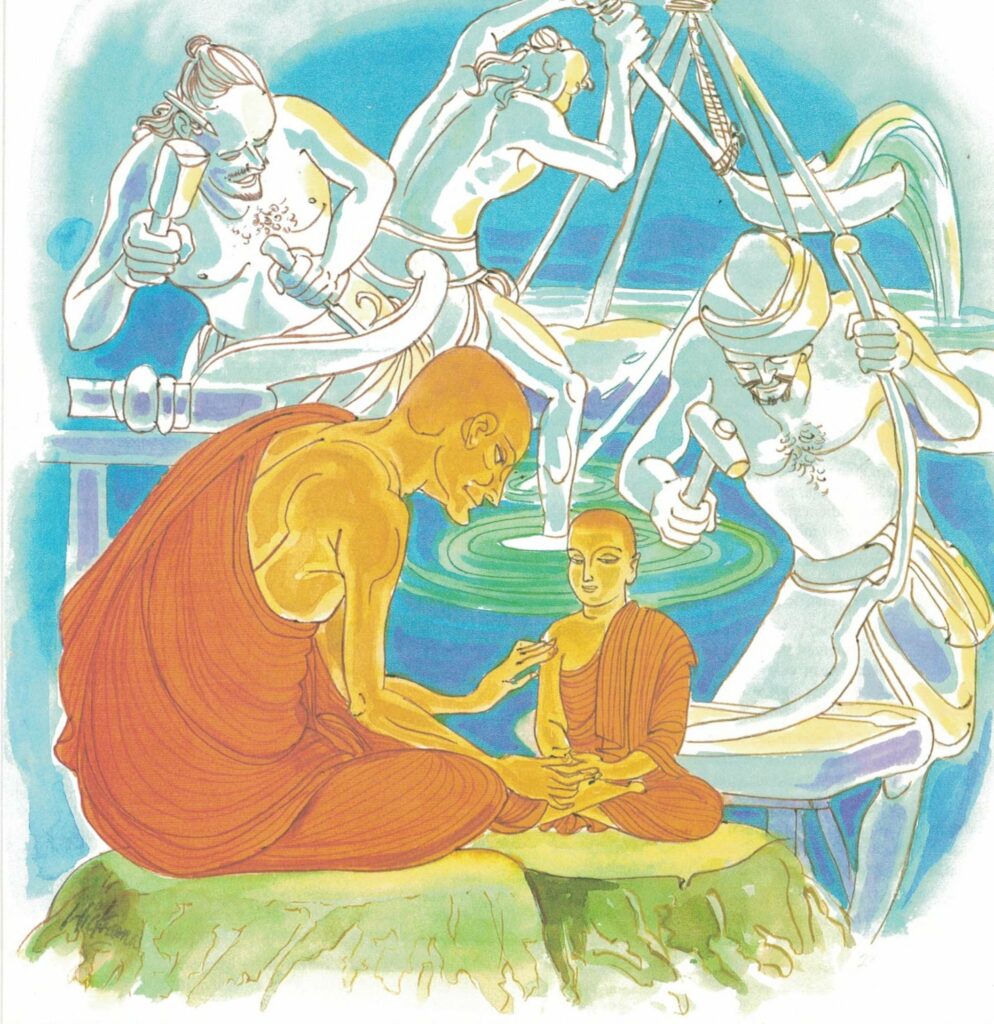Pali text, illustration and English translation of Dhammapada verse 145:
udakaṃ hi nayanti nettikā usukārā namayanti tejanaṃ |
dāruṃ namayanti tacchakā attānaṃ damayanti subbatā || 145 ||
145. Irrigators govern waters, fletchers fashion shafts, as joiners shape their timber those of good conduct tame themselves.

The Story of Novice Monk Sukha
While residing at the Jetavana Monastery, the Buddha spoke this verse, with reference to Sukha, a sāmanera (novice monk).
Sukha was made a novice monk at the age of seven years by Venerable Sāriputta. On the eighth day after being made a novice monk he followed Venerable Sāriputta on his alms-round. While doing the round they came across some farmers irrigating their fields, some fletchers were straightening their arrows and some carpenters were making things like cart-wheels. Seeing these, he asked Venerable Sāriputta whether these inanimate things could be guided to where one wished or be made into things one wished to make, and the monk answered him in the affirmative. The young novice monk then pondered that if that were so, there could be no reason why a person could not tame his mind and practice tranquillity and insight meditation.
So, he asked permission from the monk to return to the monastery. On that very day, as the Buddha, who had gone out early in the morning, sat in the perfumed chamber, he considered to himself, “Today the novice Sukha gave his preceptor his bowl and robe and turned back, saying, ‘I will strive earnestly for the attainment of arahatship;’ has he yet completed his task?” Straightaway, he perceived that the novice had attained the three paths and fruits. Considering the matter further, the Buddha became aware of the following, “Today the novice will succeed in attaining arahatship.” With this thought in his mind, the Buddha went forth from the perfumed chamber, and posting himself at the gateway, stood on guard.
The Venerable brought the food. The Buddha asked him four questions, and when he had answered the last of the questions, the novice attained arahatship. Then the Buddha addressed the Venerable, saying, “Go, Sāriputta, give the novice his food.” The elder monk went and forced the door, whereupon the novice came out and paid his respects to the Venerable. “Eat the food I have brought you,” said the Venerable.
Just then the Buddha approached and asked, “Monks, what is it that you are sitting here talking about now?” The monks replied, “Venerable, today the morning seemed very long, and the evening was tardy. The novice has but just finished his meal. Moreover the sun has just passed beyond the zenith before our very eyes.” The Buddha replied, “Monks, that is what always happens when they that possess merit engage in meditation. Today the novice Sukha saw ditch-diggers leading the water in a watercourse, arrow-makers straightening their arrows, and carpenters fashioning wheels and so forth. And having seen these things, he subdued himself and attained arahatship.”
Explanatory Translation (Verse 145)
nettikā hi udakaṃ nayanti usukārā tejanaṃ namayanti
tacchakā dāruṃ namayanti subbatā attānaṃ damayanti panditā
nettikā: irrigators; udakaṃ [udaka]: water; nayanti: lead along to whatever place they like; usukārā: the fletchers; tejanaṃ [tejana]: arrow shafts; namayanti: shape; tacchakā: the carpenters; dāruṃ [dāru]: the wood; namayanti: bend; subbatā: the conscientious; attānaṃ [attāna]: the self; damayanti: control; panditā: the wise persons
Irrigators direct the water. Fletchers shape the arrows. Carpenters shape the wood. The wise conscientiously control themselves.
Commentary and exegetical material (Verse 145)
subbatā: the obedient ones. A subbatā is a person who is amenable to advice. They obey the advice given. Traditional commentary describes them this way: sukhena ovaditabbā, anusāsi tabbāti subbatā… A person who could be easily advised and instructed. A really obedient person (subbatā) never resents any advice, even if harshly given. The response of such a person is–“If you do not advise me, who else will?”